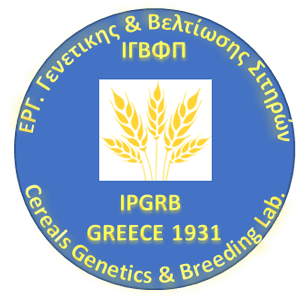Αξιολόγηση και ανάδειξη ποικιλιών σίτου για τη παραγωγή νέων προϊόντων άλεσης με υψηλή διατροφική αξία, , (ΕΥΔΕ-ΕΤΑΚ: Τ2ΕΔΚ-01244, ΜΙS: 5072523) στο πλαίσιο της δράσης «Ερευνώ-Δημιουργώ-Καινοτομώ» Παρέμβαση ΙΙ, Β’ Φάση
Φορείς: 1. ΕΚΕΤΑ/ΙΝΕΒ, (Εθν. ΚέντροΈρευνας & Τεχνολ. Ανάπτυξης – Ιν.
Εφαρμ. Βιοεπιστημών), 2. ΠΑ/ΤΕΤΔ (Παν. Αιγαίου -Τμ. Επ. Τροφίμων & Διατροφής), 3. ΕΛΓΟ-ΔΗΜΗΤΡΑ/ΙΓΒΦΠ (Ιν. Γενετικής Βελτίωσης & Φυτ. Πόρων), 4. ΚΥΛΙΝΔΡΟΜΥΛΟΙ ΧΑΛΚΙΔΙΚΗΣ Α.Ε, 5. ΧΑΡΕΝΗΣ ΜΙΛΤΙΑΔΗΣ
Μεθοδολογικά η πρόταση οργανώνεται σε τέσσερεις ενότητες εργασίας. Ξεκινάει από το γενετικό έλεγχο με εφαρμογή γονιδιωματικών τεχνικών για την αποτίμηση του γενετικού δυναμικού τους ώστε να ενταχθούν σε προγράμματα γενετικής βελτίωση. Παράλληλα, γίνεται η αγροκομική αξιολόγηση σε κατάλληλες περιοχές για την καλλιέργεια των ποικιλιών και καταγράφονται αγροκομικά, ποιοτικά κ.α. χαρακτηριστικά, καθώς και η διατροφική αξία της κάθε ποικιλίας. Στις ΕΕ2 και ΕΕ3 θα παραχθούν άλευρα και μείγματα αυτών, θα εκτιμηθεί η διατροφική τους αξία με συνδυασμό αναλύσεων και θα ακολουθήσουν δοκιμές για την εκτίμηση της in vitro και in vivo διατροφικής τους αξίας. Συνολικά το έργο αποσκοπεί στο να δημιουργήσει και να ενισχύσει μία αλυσίδα αξίας από Ελληνικά παραγόμενο σιτάρι που θα αξιοποιείται από τοπικές βιομηχανίες για την παραγωγή ποιοτικών προϊόντων με υψηλή προστιθέμενη αξία.
Ενδεικτικά αναμενόμενα οφέλη της συγκεκριμένης πράξης, μέσα από τις παρεμβάσεις που αυτή περιλαμβάνει, είναι η αξιολόγηση των ελληνικών ποικιλιών σίτου σε σχέση με τις περιβαλλοντικές συνθήκες καλλιέργειας σε διαφορετικές περιοχές της Κ. Μακεδονίας, όσον αφορά στη διατροφική τους αξίας, στην παραγωγικότητα και ανθεκτικότητα σε βιοτικές και αβιοτικές καταπονήσεις, δημιουργώντας νέα άλευρα ή μείγματα αυτών.
Στόχος της πράξης είναι, μέσω της εφαρμογής σύγχρονων γονιδιωματικών τεχνικών αποτίμησης του γενετικού υλικού να προετοιμαστεί η Ελληνική Βιομηχανία τροφίμων στις μεταβολές των περιβαλλοντικών συνθηκών καλλιέργειας, λόγω της Κλιματικής Αλλαγής και να αναζητηθούν νέες, τοπικές ποικιλίες σίτου, που θα μπορούν να αξιοποιηθούν από τις
τοπικές βιομηχανίες για την παραγωγή ποιοτικών προϊόντων με υψηλή προστιθέμενη αξία.
Προϋπολογισμός ΙΓΒΦΠ: 159175,00 ευρώ
Το έργο συγχρηματοδοτείται από το Ευρωπαϊκό Ταμείο Περιφερειακής Ανάπτυξης.
«Η εργασία υλοποιήθηκε στο πλαίσιο της Δράσης ΕΡΕΥΝΩ – ΔΗΜΙΟΥΡΓΩ – ΚΑΙΝΟΤΟΜΩ και συγχρηματοδοτήθηκε από την Ευρωπαϊκή Ένωση και εθνικούς πόρους μέσω του Ε.Π. Ανταγωνιστικότητα, Επιχειρηματικότητα & Καινοτομία (ΕΠΑνΕΚ) (κωδικός έργου:Τ1ΕΔΚ-01244-GrWheat)»




